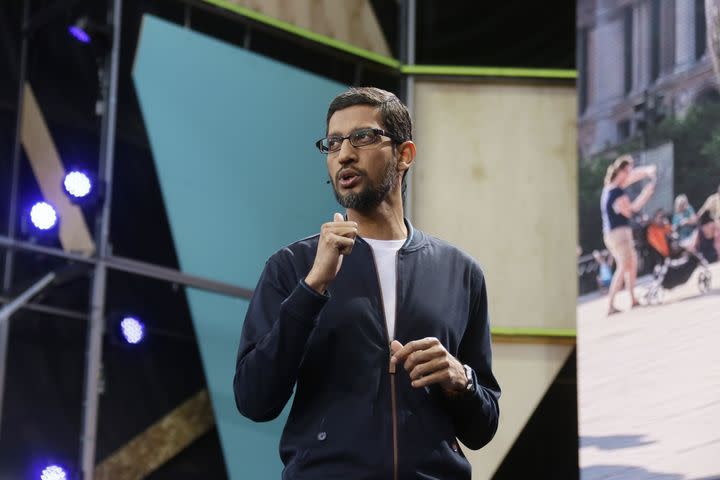Google just made it clear that it’s trying to catch up in 3 big areas

MOUNTAIN VIEW, CALIF. — Google may not have picked out a food name for the next version of Android, but there’s only one possible meal-based moniker for the keynote that opened its I/O conference here Wednesday morning: ketchup.
In three big areas — voice-driven personal assistants, messaging and bots, and virtual reality — Google showed itself keen on not getting left behind competing efforts.
Google wants to go Home
Google and Apple (AAPL) may have started us talking to our phones and tablets. However, it’s Amazon (AMZN) that’s trained many of us to interact with a computer only by voice through Amazon Echo, a wireless speaker and voice command device. Now, Amazon’s Echo has progressed past its awkward early stages to draw 3 million customers, per an estimate from Consumer Intelligence Research Partners.
Google wants in on that market.
Google CEO Sundar Pichai led off the keynote by noting that one in five Android queries in the US happen via voice. Now, those conversations can be more personalized and productive with “Google assistant” — the latest iteration of the brains behind Google Now.
"We want to be there for our users asking, hi, how can I help?" CEO of subsidiary of Alphabet, Inc. (GOOG) said. For instance, a Google assistant exchange that began with a question about movies nearby could end with the app buying four tickets.
And with the arrival later this year of Google Home — an Echo-esque, voice-controlled, coffee-pot-size device that doubles as a speaker and Chromecast audio receiver — that conversation won’t be confined to phones and tablets. It won’t be confined to their users, either.
Said product manager Mario Quiroz: "It will let anyone in the family, kids or adults, have a conversation with Google."
Allo and Duo
Google seized an early lead in internet-delivered messaging when it invited users to sign up for Google Voice calling and messaging back in 2010. Then it squandered its head start with years of neglect of the service and the Hangouts app that’s gradually taken over its functions.
Now that competing services like Apple’s iMessage, Facebook’s (FB) Messenger and the Facebook-owned WhatsApp have won millions of users by providing souped-up messaging, Google devoted much of the I/O keynote to two comparable apps.
Allo (French for “hello”) seems aimed straight at WhatsApp. It lets you use your existing phone number and provides more ways to carry on a conversation, such as automatically-suggested “smart replies” and varying text sizes to suggest you’re whispering or shouting.
Like Facebook’s Messenger, Allo will let you banter with a bot — Google assistant — for help or amusement should you not have any human pals available to chat.
But while WhatsApp encrypts messages from end to end — a security feature that’s upset some US politicians — Allo will only do so if you engage its “incognito” mode.
The second app, Duo, provides simplified one-to-one video calls like like Apple’s FaceTime, but not confined to one company’s hardware. It’s designed to work on slow or unreliable wireless connections. It also does away with the concept of a ring; when somebody calls, you see their live video before you pick up.
Google says both apps will ship this summer for Android and iOS. It’s not saying where that leaves Google Voice or Hangouts, though.
Daydreaming about VR
Virtual reality represents another area where Google has let other products steal some of the limelight it won two years ago when it introduced Cardboard at 2014’s I/O conference.
That cheap, cardboard-plus-plastic-lenses enclosure for a phone playing VR content is still around, but at this year’s I/O Google announced a new platform to make "high-quality, mobile virtual reality” as widespread as Cardboard-viewed panoramas.
This new Daydream starts with specifications for Android phones that eliminate lag with faster graphics and more responsive sensors, adds a reference design for a VR headset accompanied by a motion-sensing controller akin to the Nintendo Wii’s, and concludes with ways to browse or buy VR content in Google’s Play store.
Note that this doesn’t involve new Google hardware. It will do fine if Daydream gets more people to buy these souped-up Android phones, starting this fall.
What about Android?
Google did not neglect its mobile operating system. The next version of Android will feature a split-screen mode to run two apps at once, helping Google catch up to existing features in Apple and Samsung mobile devices. The Android will also feature tweaks to extend battery life, speed app-install times and save on storage.
And even older versions of Android will be able to try Android Instant Apps — a new form of app distribution that lets part of one “run instantly, without installation,” product manager Ellie Powers explained. Android will get and run only the parts of an app needed to perform a task like paying a parking meter; if you then want the whole app, one tap installs it.
Almost everybody here expected Google to announce the name of the upcoming Android version that right now is known only as “Android N.” But instead of christening it “Nutella,” the obvious dessert name to follow last year’s Marshmallow, Google engineering vice president Dave Burke said the company would take your suggestions at android.com/n.
Burke had one futile request about that: "Please don't call it Namey McNameface."
Email Rob at rob@robpegoraro.com; follow him on Twitter at @robpegoraro

 Yahoo Finance
Yahoo Finance 